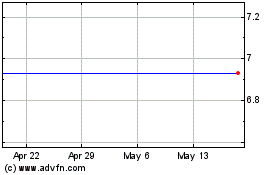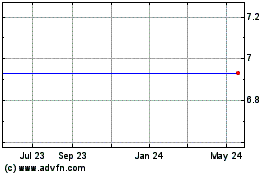Google Must Silo Fitbit Data, EU Says, Clearing $2.1 Billion Deal -- Update
18 December 2020 - 3:03AM
Dow Jones News
By Sam Schechner
European Union antitrust officials approved Google's $2.1
billion acquisition of health tracker Fitbit Inc., but will enforce
conditions on the deal aimed at protecting users' health data and
preserving competition in the wearable-tech sector.
The European Commission, the EU's top antitrust regulator, said
Thursday that it has accepted a sweetened package of concessions
from Google, clearing the way for the Alphabet Inc. company to push
more deeply into the wearable-device and health-data
businesses.
Google offered its concessions as part of the EU's in-depth
investigation into the deal, which the bloc opened in August after
rejecting Google's initial commitments as inadequate. The Fitbit
deal, first agreed to in November 2019, remains under review by the
U.S. Justice Department and Australia's competition authority.
To address competition concerns, Google is now promising not to
use Fitbit data for advertising purposes in Europe, and to store
such data separate from any other Google data used in ads. The
company also promised to allow users to link competing apps to
their Fitbit data, and committed to allowing competing
wearable-device makers open access to functions of Google's Android
operating system.
The commitments will remain in force for 10 years, and the
advertising-related commitments can be extended for another 10
years. An independent trustee with access to internal Google
documents will enforce the promises, the commission said.
"We understand that regulators wanted to look closely at this
transaction, and we have worked constructively with them to resolve
their concerns, including the set of legally binding commitments
the European Commission accepted today," a Google spokeswoman said,
adding that the company is continuing to work with other
regulators.
The EU's approval of the Fitbit deal comes as Google and other
U.S.-based tech giants face a slew of new antitrust cases and
investigations into their alleged anticompetitive practices in both
the U.S. and the EU. On Tuesday, the EU proposed fresh legislation
that would create new obligations for fair treatment of competitors
and interoperability of technologies for companies the EU calls
"gatekeepers."
Some critics have accused tech firms of using acquisitions to
eliminate potential competitors, arguing that merger controls in
the U.S. and EU haven't been aggressive enough in recent years.
After the Fitbit deal, Google competitors raised concerns that
Google could box them out of the market for health bracelets and
watches. Privacy campaigners had, meanwhile, objected that Google
could leverage mountains of health information to hone invasive
advertising
The European Commission on Thursday said that there was little
overlap between Google and Fitbit's businesses, adding that the
latter has "limited market share" in Europe.
BEUC, an umbrella organization for European consumer-rights
groups, said the deal could still allow Google to "exploit Fitibit
users' data" and risks giving consumers less choice of wearable
fitness devices.
"This may be another example of the inability of EU merger
control to prevent companies like Google from ever expanding their
market power," said Monique Goyens, the group's director
general.
Write to Sam Schechner at sam.schechner@wsj.com
(END) Dow Jones Newswires
December 17, 2020 10:48 ET (15:48 GMT)
Copyright (c) 2020 Dow Jones & Company, Inc.
Fitbit (NYSE:FIT)
Historical Stock Chart
From Dec 2024 to Jan 2025

Fitbit (NYSE:FIT)
Historical Stock Chart
From Jan 2024 to Jan 2025
